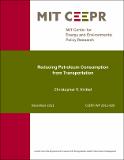Reducing Petroleum Consumption from Transportation
Author(s)
Knittel, Christopher R.
Downloadmain article (566.5Kb)
Terms of use
Metadata
Show full item recordAbstract
The United States consumed more petroleum-based liquid fuel per capita than any other OECD- high-income country- 30 percent more than the second-highest country (Canada) and 40 percent more than the third-highest (Luxemburg). This paper examines the main channels through which reductions in U.S. oil consumption might take place: (a) increased fuel economy of existing vehicles, (b) increased use of non-petroleum-based low-carbon fuels, (c) alternatives to the internal combustion engine, and (d) reduced vehicles miles travelled. I then discuss how the policies for reducing petroleum consumption used in the US compare with the standard economics prescription for using a Pigouvian tax to deal with externalities. Taking into account that energy taxes are a political hot button in the United States, and also considering some evidence that consumers may not correctly value fuel economy, I offer some thoughts about the margins on which policy aimed at reducing petroleum consumption might usefully proceed.
Description
http://web.mit.edu/ceepr/www/publications/workingpapers.html
Date issued
2011-12-01Publisher
MIT CEEPR
Citation
WP-2011-020
Series/Report no.
CEEPR Working Papers;2011-020
Collections
The following license files are associated with this item: